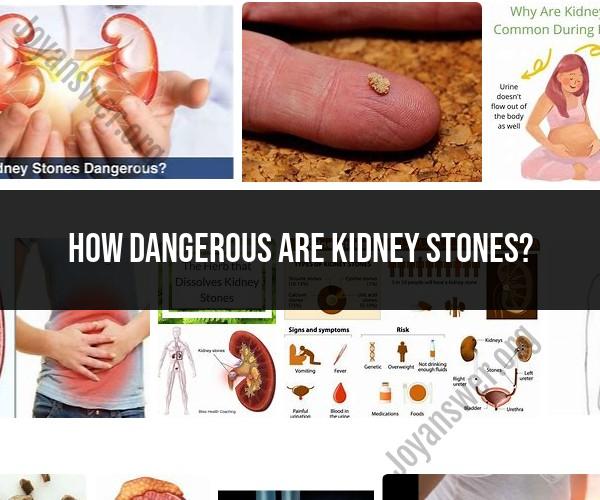How dangerous are kidney stones?
Kidney stones can be painful and, in some cases, pose health risks. The level of danger associated with kidney stones depends on various factors, including the size, location, and composition of the stones, as well as the individual's overall health. Here are some considerations regarding the dangers and risks of kidney stones:
Pain and Discomfort: One of the most immediate and common dangers associated with kidney stones is the intense pain they can cause. When a stone moves within the urinary tract, it can lead to severe pain, often described as one of the most painful experiences a person can have.
Obstruction: If a kidney stone becomes lodged in the urinary tract, it can obstruct the flow of urine. This can cause pressure to build up in the affected kidney and lead to additional pain, as well as potential damage to the kidney.
Infection: Urinary tract infections (UTIs) can occur as a result of kidney stones. When stones block the normal flow of urine, bacteria can accumulate in the urinary tract, increasing the risk of infection.
Hematuria: Kidney stones can cause hematuria, which is the presence of blood in the urine. While this is often not dangerous on its own, it can be an indicator of underlying issues, such as injury to the urinary tract.
Complications: In some cases, kidney stones can lead to complications, such as hydronephrosis (swelling of the kidney due to blocked urine flow), kidney damage, or kidney infection (pyelonephritis). These complications can be more serious and may require medical intervention.
Recurrent Stones: Individuals who have had kidney stones in the past are at a higher risk of developing additional stones. Recurrent kidney stones can lead to ongoing discomfort and health concerns.
Rare but Severe Complications: Although relatively rare, certain complications, such as sepsis (a severe infection that can be life-threatening) or the formation of large, obstructive stones, can pose significant risks to health.
It's important to note that many kidney stones are small and pass through the urinary tract without causing significant problems. In such cases, the danger is relatively low, and the primary concern is managing the pain and discomfort.
However, if you suspect you have kidney stones or are experiencing symptoms such as severe pain, blood in the urine, fever, or signs of infection, it's crucial to seek medical attention promptly. A healthcare provider can diagnose the condition, assess the size and location of the stones, and recommend appropriate treatment, which may include pain management, hydration, and in some cases, procedures to remove or break up the stones.
Preventative measures, such as staying well-hydrated, maintaining a balanced diet, and addressing underlying medical conditions that increase the risk of stone formation, can also help reduce the likelihood of developing kidney stones. Consulting with a healthcare professional is essential for managing kidney stones and minimizing associated risks.
Kidney Stones: Understanding the Risks and Dangers
Kidney stones are hard deposits that form in the kidneys. They can be made up of different minerals and salts, including calcium, oxalate, uric acid, and cystine. Kidney stones can vary in size, from as small as a grain of sand to as large as a golf ball.
Kidney stones are a common medical condition, affecting about 10% of people in the United States at some point in their lives. Men are more likely to develop kidney stones than women.
Causes and Complications of Kidney Stones
The exact cause of kidney stones is not always known. However, there are a number of factors that can increase your risk of developing kidney stones, including:
- Dehydration: Not drinking enough fluids can cause urine to become concentrated, which can lead to the formation of kidney stones.
- Diet: Eating a diet that is high in protein, sodium, and sugar can increase your risk of developing kidney stones.
- Certain medical conditions: Certain medical conditions, such as obesity, diabetes, and Crohn's disease, can increase your risk of developing kidney stones.
- Family history: If you have a family history of kidney stones, you are more likely to develop them yourself.
Kidney stones can cause a variety of complications, including:
- Pain: Kidney stones can cause severe pain in the back, sides, and groin.
- Blockage: Kidney stones can block the flow of urine, which can lead to infection and kidney damage.
- Infection: Kidney stones can increase the risk of kidney infections.
- Kidney damage: Kidney stones can damage the kidneys, which can lead to kidney failure.
Managing and Preventing Kidney Stones
If you have kidney stones, there are a number of things you can do to manage your pain and prevent complications. These include:
- Drinking plenty of fluids: Drinking plenty of fluids can help to flush out kidney stones and prevent them from forming.
- Taking pain medication: Over-the-counter pain relievers, such as ibuprofen and acetaminophen, can help to relieve the pain caused by kidney stones.
- Passing kidney stones: Small kidney stones may pass on their own. However, larger kidney stones may need to be removed surgically.
- Preventing kidney stones: There are a number of things you can do to prevent kidney stones, such as drinking plenty of fluids, eating a healthy diet, and maintaining a healthy weight.
If you are concerned about your risk of developing kidney stones, talk to your doctor. They can help you to develop a plan to manage your risk and prevent kidney stones.
Here are some additional tips for managing and preventing kidney stones:
- Eat a diet that is low in protein, sodium, and sugar. These substances can increase the risk of kidney stones.
- Eat plenty of fruits and vegetables. Fruits and vegetables are high in fiber and water, which can help to prevent kidney stones.
- Exercise regularly. Exercise can help to reduce your risk of developing kidney stones.
- Maintain a healthy weight. Obesity is a risk factor for kidney stones.
If you have any questions or concerns about kidney stones, be sure to talk to your doctor.













